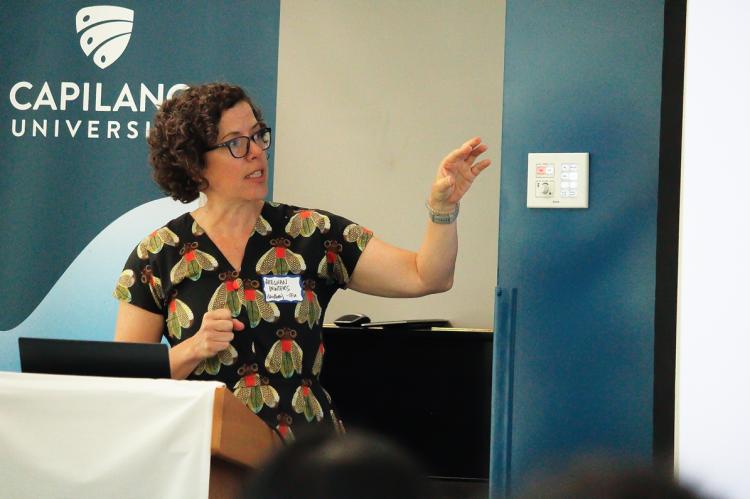Capilano University (CapU) recently marked a significant milestone in its creative activity, research and scholarship (CARS) journey by hosting its first-ever Faculty Research Symposium. Co-hosted by the CARS office and the university library, the event took place on Friday, April 25, and welcomed more than 70 attendees - including faculty, students and community partners - who gathered to explore and celebrate the breadth of research taking place across the University.

SFU professor Meghan Winters, PhD, presents the keynote address at CapU's inaugural Faculty Research Symposium on April 25, 2025. (Photo: Shruti Karthikeyan)
"It was an absolute delight to experience a part of the research and scholarly journeys of many faculty," said University Librarian Christina Neigel, PhD, remarking on the day's events. "I hope this day provides others with excitement and energy to engage or re-engage with their own areas of work."
The symposium opened with an engaging keynote presentation by Meghan Winters, professor in the Faculty of Health Sciences at Simon Fraser University who earned her doctorate from the School of Population and Public Health at UBC, and PhD candidate Meridith Sones. Their talk, "Building Research Programs - Lessons Learned in the Evolution of the Cities, Health, and Active Transportation Research (CHATR) Lab," emphasized the power of community-led research and the importance of strong, reciprocal partnerships in addressing real-world challenges.
Drawing on their experiences, Winters and Sones shared valuable insights, offering practical advice on mentoring student researchers, approaching new collaborators and securing research funding. They showcased how grounded, community-focused research can lead to meaningful impact and more effective knowledge sharing.
Following the keynote, attendees participated in an interactive World Café session designed to spark cross-campus dialogue. Small groups rotated through five themed areas of research practice providing informal, peer-led conversations on topics like publishing, research data management and navigating ethics approvals. Participants raised questions, traded advice, and connected across disciplines, strengthening the strong sense of community, curiosity and collaboration that drives research at CapU.
At the core of the symposium were 13 faculty presentations. Topics ranged from the digital reconstruction of historical costumes, to disinformation literacy, to analyzing toxin levels in crabapples - reflecting the real-world relevance of research at CapU. Faculty members shared their findings, methodologies and implications of their work, sparking engaging discussions and inspiring future research endeavours.
Complementing the Faculty Research Symposium was the annual Student Research Symposium, held on Saturday, April 26. The annual event highlighted student-led projects, with more than 100 students from all five faculties presenting their work.
This was the ninth year for the event, which each year sees more support from departments, CARS and the University in terms of student and faculty participation as well as funding, said Kym Stewart, PhD, an instructor and convenor in CapU's Faculty of Business & Professional Studies, and lead organizer of the Saturday symposium.
"It takes this wide support to create an event celebrating student research in a public and CapU community forum," Stewart said. "This setting provides more cross-pollination of ideas and work, and we hope next year will include more students from all the faculties to help us celebrate 10 years of the Student Research Symposium."
"The success of both research symposiums builds on a growing research culture at CapU and cultivating a vibrant research community that contributes meaningfully to the advancement of knowledge and society," noted Dawn Whitworth, PhD, associate vice-president, CARS & Graduate Studies.












